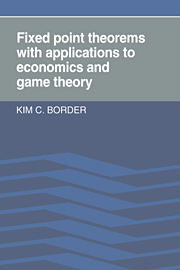Book contents
- Frontmatter
- Contents
- Preface
- 1 Introduction: models and mathematics
- 2 Convexity
- 3 Simplexes
- 4 Sperner's lemma
- 5 The Knaster-Kuratowski-Mazurkiewicz lemma
- 6 Brouwer's fixed point theorem
- 7 Maximization of binary relations
- 8 Variational inequalities, price equilibrium, and complementarity
- 9 Some interconnections
- 10 What good is a completely labeled subsimplex
- 11 Continuity of correspondences
- 12 The maximum theorem
- 13 Approximation of correspondences
- 14 Selection theorems for correspondences
- 15 Fixed point theorems for correspondences
- 16 Sets with convex sections and a minimax theorem
- 17 The Fan-Browder theorem
- 18 Equilibrium of excess demand correspondences
- 19 Nash equilibrium of games and abstract economies
- 20 Walrasian equilibrium of an economy
- 21 More interconnections
- 22 The Knaster-Kuratowski-Mazurkiewicz-Shapley lemma
- 23 Cooperative equilibria of games
- References
- Index
1 - Introduction: models and mathematics
Published online by Cambridge University Press: 16 January 2010
- Frontmatter
- Contents
- Preface
- 1 Introduction: models and mathematics
- 2 Convexity
- 3 Simplexes
- 4 Sperner's lemma
- 5 The Knaster-Kuratowski-Mazurkiewicz lemma
- 6 Brouwer's fixed point theorem
- 7 Maximization of binary relations
- 8 Variational inequalities, price equilibrium, and complementarity
- 9 Some interconnections
- 10 What good is a completely labeled subsimplex
- 11 Continuity of correspondences
- 12 The maximum theorem
- 13 Approximation of correspondences
- 14 Selection theorems for correspondences
- 15 Fixed point theorems for correspondences
- 16 Sets with convex sections and a minimax theorem
- 17 The Fan-Browder theorem
- 18 Equilibrium of excess demand correspondences
- 19 Nash equilibrium of games and abstract economies
- 20 Walrasian equilibrium of an economy
- 21 More interconnections
- 22 The Knaster-Kuratowski-Mazurkiewicz-Shapley lemma
- 23 Cooperative equilibria of games
- References
- Index
Summary
Mathematical Models of Economies and Games
Supply and demand: These are the determinants of prices in a market economy. Prices are determined by markets so that the supply of commodities from producers is equal to the demand for commodities by consumers. Such a state of equality is known as a market equilibrium. In a large market economy the number of prices determined is enormous. Aside from the practical difficulty of computing and communicating all those prices, how can we even be sure that it is possible to find prices that will equate supply and demand in all markets at once? Mathematicians will recognize the problem as one of proving the existence of a solution to a set of (nonlinear) equations. The first successful efforts by mathematicians toward answering this question took place in the 1930's, in a workshop conducted by Karl Menger in Vienna. The seminars were attended by many of the finest mathematicians of the period and produced the pathbreaking papers of Wald [1935; 1936]. Also published in the proceedings of Menger's seminar was an important piece by von Neumann [1937]. At about the same time, mathematicians began an intensive study of games and what outcomes ought to be expected from a game played by rational players. Most of the proposed outcomes are characterized as some form of “equilibrium.” That is, the outcome of a game ought to be a situation where no player (or perhaps no group of players) wants to change his play.
- Type
- Chapter
- Information
- Publisher: Cambridge University PressPrint publication year: 1985



